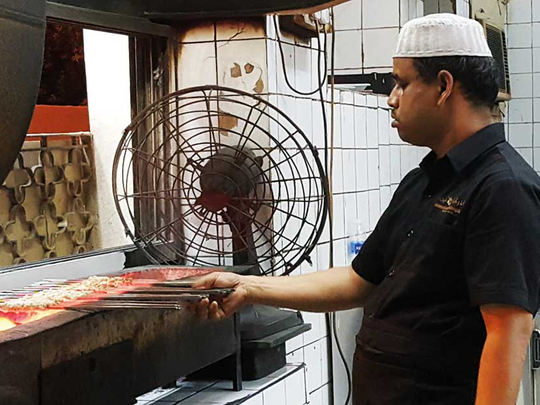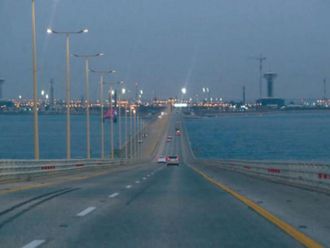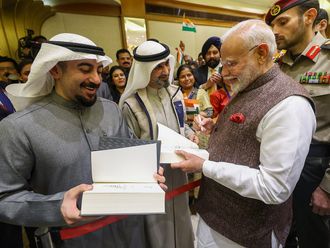
Manama: Wedged in between tall buildings on Zubara Road in downtown Manama, Ameen Restaurant is not just a small outlet that serves food late into the night.
It is also one of the most visible portraits of increasingly rare landmark buildings in an area where developers have replaced old buildings with taller, often character-less structures.
Ameen is so tiny that it cannot accommodate more than a dozen people together, but it is no accident that it has survived on a road where old shops are being inexorably taken over. Even the premises of the famous Al Ahli Sports Club had been turned into shops and apartments.
Ameen restaurant opened in 1948 and steadily gained a reputation as one of the best restaurants, serving kebab, grilled meat, tikka and meat cutlets, cooked on skewers over a fire.
The area of Gudhaibiya is well known for its plethora of restaurants from various countries, serving all kinds of food. But when it comes to kebab and tikka, ask any person in Bahrain familiar with restaurants and they will without the slightest hesitation mention Ameen.
For many, the restaurant is not just about food, no matter how palatable it is. It is closely associated with their early memories of growing up in the vibrant neighbourhoods of Manama.
“Popular restaurants are among the first steps we took into public life and a place that taught us how to acquire social skills, and for us, Ameen restaurant was synonymous with reaching adulthood,” Saeed Al Hamad, a radio talk show host and a columnist, said. “We were still in school, but going to this restaurant meant that we were no longer dependent on our parents to take us out and enjoying the freedom to choose where to go to have a bite.”
Abdul Rahman, one of the restaurant’s waiters, loomed larger than life in the mind of young Saeed.
“He was an expert in carrying mountains of plates loaded with kebab and salads, alongside the oven-hot traditional bread. One day, we were so curious to know how many plates he could carry at once, and we stopped him. We counted 21 plates, and you can imagine how awed we were with the prowess of this thin-looking man.”
The restaurant had only one hand towel next to the wash basin then, Saeed recalled.
“The customers had to share the towel and the Lifebuoy soap bar. Nobody protested or said anything about it, and we were all so excited about eating Ameen kebab that we did not bother about hygiene.”
The restaurant started with mainly Iranian and Bahraini staff.
“The kebab and tikka had a special flavour that people could easily recognise it as Ameen’s,” Abdullah, the supervisor of the restaurant, said. “They came from all parts of Bahrain and even today, we still have people who place their orders while waiting inside their cars parked near the restaurant.”
Yusuf Hamdan, a towering literary figure in Bahrain, has fond memories of Ameen restaurant and other food outlets in Manama.
“They were hugely popular, of course, and for many of us, they are associated with growing up in a multicultural, pluralistic society where people from various countries came together to provide us with what was to us then the most exquisite food,” he said. “There was Ameen restaurant with its delicious tikka and kebab and there was Alo Bashir with his Indian food. We had so many popular cafés. These places were what we considered then the most salient places that helped build characters and provided people with invaluable social skills. To me and to many like me who frequented them, it is nostalgia all the way.”
Abdullah agreed that many people felt nostalgia about Ameen today.
“There were many Bahraini families that lived in the areas for decades; however, with the economic changes and the massive construction projects, several families opted out of the areas and moved to other towns. Many of our neighbours were hired in faraway locations and with the building of new towns, they purchased their own homes. As Bahrainis left, expatriates moved in and the interest in tikka and kebab decreased. We still have many of customers, but of course the change in the demography affected us in many ways.”
A sign of the time is the five men preparing, grilling and serving the tikka and the kebab — They were all Bangladeshis. They replaced the Bahrainis and Iranians who helped the restaurant build its reputation and thrive.
“Do I think the restaurant will survive long? Most certainly! You can look. We are making some new seating arrangements and changing the decor inside so that we can accommodate our customers and offer them the comfort zone they deserve,” Abdullah said as he pointed to the workers moving wooden tables and chairs next to the far corner under the supervision of Ameen’s son sitting on a high stool.
Customers today include older people who drive kilometres and brave congestion to buy tikka or kebab, he said.
“We also have young people and we also have those who come late in the evening at the end of a long day or want to have a late dinner and take home some parcels to their families.”
Seventy years after it was established, Ameen restaurant may not be the hot spot it was in its heyday, but it does remain a legend on Zubara Road where it still stands proudly much as it has for decades.












